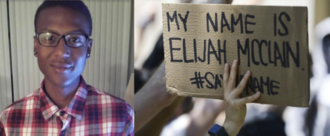-
FIGHT BACK AGAINST POLICE BRUTALITY AND MURDERWe as Citizen should not have to stand by helplessly and watch another Citizen Beaten or Murdered right in front of US, just because the Murderer is wearing a police uniform.260 of 300 SignaturesCreated by Edward Beckford
-
Fact Checking during Presidential debatesWe have seen false information presented in past debates, where issues turn into "he said, she said," and facts get turned into "opinions." This does not help the public to assess the candidates, nor their platforms. It is impossible for one candidate to hold the other accountable during a debate, as it is so easy to sidestep or attack. The moderators need to have clearly stated positions where they can simply note that questions have not been answered, and there is "30 seconds left to try again." If questions are still not answered, this needs to be simply stated. The pressure needs to be on the candidates to answer, not on the moderators to try to get them to answer.52 of 100 SignaturesCreated by CRAIG PENNER
-
Improve contact tracing in Palm Beach County NOWCurrently, contact tracing is not required in Palm Beach County for those who test positive. Contact tracing is essential to stopping Coronavirus. In South Korea, where contact tracing is prioritized, the curve is nearly flat and the economy has not majorly suffered.43 of 100 SignaturesCreated by Nina Boiton
-
Entertainment industry workers need an extension to FPUCThe entire live event industry has been shut down plunging everyone working in it into unemployment with no end in sight. People like me who have invested 38 years of my life to be at the top of my game working on Broadway. The extra $2400 monthly has allowed me to have a grain of hope that I can hold on long enough living in one of the most expensive areas in the country. If I lose it, I will need to sell my place and move away from NYC. Hundreds of thousands more are in the same position all over the country. We are ready to work but work is not ready for us.91,806 of 100,000 SignaturesCreated by David Patridge
-
Add your Name & Tell the Senate: Cut the Pentagon budget!In a moment of national reckoning amidst continuing state violence against Black, Brown, and Muslim communities at home and abroad, record job loss, and a re-surging coronavirus pandemic, Congress seems to think it’s time for business as usual. And they are about to pass a MASSIVE spending bill that would provide the Pentagon with a record breaking $740.5 BILLION. It’s clear that too many of our Senators simply don't get it. Luckily, our champions in Congress DO — will you add your name to join with them? Senators Sanders, Markey, and Warren, joined across the Capitol by progressive allies like Representatives Barbara Lee, Mark Pocan, and Pramila Jayapal in the House, are marking this moment with bold vision. Together, they are leading on a call for a 10% cut to the Pentagon budget — $74 BILLION — to create jobs, improve education, and make housing more affordable across the country. Sign your name now to support an amendment to the National Defense Authorization Act calling for a 10 percent cut in the Pentagon budget!2,727 of 3,000 SignaturesCreated by Win Without War

-
Justice for Aryues TownsendIt’s been 10 months and no one has been charged. The driver has been identified and still no charges. Aryues Townsend was 24 years old and deserves justice. He was proud to be an organ donor and was able to save 7 lives. He loved and lived life to fullest! He was well loved by so many. His family and friends deserve closure. We want justice for Aryues Townsend!63 of 100 SignaturesCreated by LaCresha Townsend
-
Keep Kailua Locals IN Kailua -- We need affordable housing in Kailua NOW!We are a volunteer group of Kailua renters and homeowners working in association with Faith Action for Community Equity. We believe housing is a human right, and we are interested in ensuring affordable rentals for our low-income families, seniors and disabled on fixed incomes in Kailua. We believe Kawainui Affordable Rental Project to be a thoughtful and well-designed project. No affordable rentals have been built in Kailua in over 30 years. It is time to work together to provide housing for all of those who make up the fabric of our community. Many people throughout Kailua -- and beyond – have become passionately opposed to the Kawainui project. Most of this opposition is based on misinformation and disinformation. They have become very vocal and organized. We need to get accurate information out into the community. Kawainui Affordable Rentals would consist of 73 units located at the corner of Kawainui St. and Oneawa St., the main street through the commercial district of Kailua. Ninety-five percent of the units would be for local families earning less than $72,300 per year, with monthly rents starting at $521 for 1-bedroom units and $598 for 2-bedroom units, depending on household income. We need your help to: • Counteract Myths with Facts; • Contact family, friends and neighbors in Kailua to support this Affordable Rental Project; • Ask people to email or call their City Council representatives before August 2 when the Zoning Committee meets to recommend this project to the full Council for a vote.7,201 of 8,000 SignaturesCreated by Affordable Kailua
-
Delay the Welcoming of TouristsCOVID19 numbers on the mainland are higher than they have ever been so we need access to much more accurate and reliable testing to safely welcome tourists back to Hawaii without a quarantine requirement. Also school starts August 4th and welcoming tourism at the same time is dangerous to teachers and students. We don't yet know what the effect of opening schools will be.1,918 of 2,000 SignaturesCreated by Cara Flores
-
We stand with you against the President, BubbaPresident Trump attacked Bubba Wallace, NASCAR's only Black driver, for his courageous stand to have confederate flags banned from race tracks After taking a stand to get NASCAR to ban the confederate flag from its race tracks, Bubba Wallace's team found a noose in his garage stall at his next race. Rather than praise Wallace for his courage and leadership, President Trump attacked him with this tweet: "Has @BubbaWallace apologized to all of those great NASCAR drivers & officials who came to his aid, stood by his side, & were willing to sacrifice everything for him, only to find out that the whole thing was just another HOAX?" This was NOT a hoax. The FBI investigated, and it turns out the noose was there since October of 2019. That a noose could be in plain sight at a NASCAR track for that long without being taken down is further evidence of the culture shift needed to make the sport more racially inclusive and welcoming. Bubba is taking the high road, responding to President Trump with, "Love over hate every day. Love should come naturally as people are TAUGHT to hate. Even when it's HATE from the POTUS." Let's show Bubba we've got his back.253 of 300 SignaturesCreated by Ryan Patrick
-
Reinstate UAPD Officer Kevin PiersonKevin Pierson is vital to the Residence Life and Housing Community. Not only does he perform the duties expected of him, he also goes above and beyond. Kevin Pierson is one of the only police officers that is not biased against students based on their demogrpahics. He has changed the lives of countless students and faculty members, and terminating his employment with The University of Akron Police Department will be a deterrant to the UA Community.227 of 300 SignaturesCreated by Cennidie Hall
-
Time To Embrace More Flesh-Toned Tights!I am a young ballet dancer who has been dancing for about ten years. On stage and in competitions, I have seen a lot of people wearing pink tights even though it doesn't match their skin color and "breaks the line" of the dancer. Having a variety of skin tones in a large ballet wear company is very important, especially to increase diversity and make an inclusive ballet world. Tell Wear Moi to publicly support having more colors for flesh-toned tights and add more in their store and their website online.55 of 100 SignaturesCreated by SoEun Park

-
Aurora, CO: Demand justice for Elijah McClain and say NO to police unionsAurora, Colorado’s police force is clearly dangerous — and it’s enabled by unaccountable police union leaders who prioritize abusive officers over true community safety. It’s time for the mayor, the police chief, and the city council to rein them in. Aurora officers murdered Elijah McClain almost a year ago. A few months later officers mocked and glorified the killing. Then just last month, community members holding a peaceful vigil of violin players — honoring McClain’s life and protesting his murder — were attacked by Aurora police in riot gear, with batons and pepper spray. The police unions’ response? Marc Sears, president of Aurora’s Fraternal Order of Police (FOP) went on offense, dismissing public criticism as completely unfounded and repeatedly attacking the city’s first openly LGBTQ city council member who has dared call for accountability. The Aurora Police Association, the city’s other police union, which has been silent since McClain’s death, finally spoke up last week — only to complain about the firing of one of the officers and launch a barrage of personal attacks on the police chief, not just decrying her actions but questioning her integrity. As these atrocities have come to light, there’s been no contrition, no apology, and far too little accountability. And Aurora’s police unions have been solely concerned with knee-jerk defense of officers and deflecting any honest conversation about the problems with the department and long-overdue reform. Mayor Mike Coffman says he’s committed to stopping police violence in Aurora and creating real change. But that can’t happen through negotiation between the city and Aurora’s police unions. Like police unions across the country, Aurora’s union leaders perpetuate a violent and unaccountable police culture, routinely defend abusive cops, try to win contracts that effectively put police above the law, and do everything they can to block reform. If they’re given influence over the process, they will block any meaningful change. If Coffman and the city council are serious, they’ll follow the lead of the mayor of Minneapolis and stop any negotiations with police unions about accountability and reform. If we can convince the city of Aurora to stop letting the police unions bargain over the policies and reforms that could hold police accountable, it will help pave the way for real change in Aurora, and send a message to other cities that they can break free of the power of police unions and finally have an opportunity for real change.54,773 of 75,000 SignaturesCreated by James Rucker












